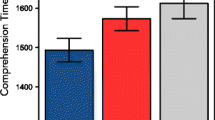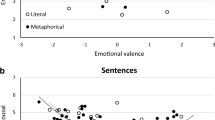Abstract
In two experiments, several personality attributes evident in metaphors people use to describe everyday experiences were examined. Subjects either generated (Experiment 1) or endorsed (Experiment 2) a metaphor that represented their views about six facets of their lives (e.g., work, relationships, graduating). In self-generated metaphors, content analyses of the metaphors revealed that attributes of optimism (e.g., looking forward to the future) and pessimism (e.g., cynicism) were significant components of metaphor content. Also, modest relationships were found between the themes of optimism contained within their metaphors and scores on an optimism scale of a questionnaire designed to evaluate the optimistic and pessimistic orientations. In a second study, subjects endorsed how strongly preselected metaphors represented important aspects of their lives. These preferences were significantly related to their scores on an optimism/pessimism instrument and a locus of control inventory. These results support the notion that metaphors, like other creative productions, may prove a useful vehicle for studying personality characteristics. They also provide evidence for the construct validity of the optimism and pessimism questionnaire.
Similar content being viewed by others
References
Alloy, L. B., & Ahrens, A. H. (1987). Depression and pessimism for the future: Biased use of statistically relevant information in predictions of the self versus others.Journal of Personality and Social Psychology, 52, 366–378.
Atkinson, J. A. (1958).Motives in fantasy, action, and society: A method of assessment and study. Princeton, NJ: D. Van Nostrand.
Barker, P. (1985).Using metaphors in psychotherapy. New York: Brunner Mazel.
Beck, A. (1967).Depression: Clinical, experimental and theoretical aspects. New York: Hoeber.
Campbell, J. D. (1986). Similarity and uniqueness: The effects of attribute type, relevance, and individual differences in self-esteem and depression.Journal of Personality and Social Psychology, 50, 281–294.
Conway, M., & Ross, M. (1984). Getting what you want by revising what you had.Journal of Personality and Social Psychology, 47, 738–748.
Dember, W.N., & Brooks, J. (1989). A new instrument for measuring optimism and pessimism: Test-retest reliability and relations with happiness and religious commitment.Bulletin of the Psychonomic Society, 27, 365–366.
Dember, W.N., Martin, S., Hummer, M., Howe, S., & Melton, R. (1989). The measurement of optimism and pessimism.Current Psychology: Research & Reviews, 8, 102–119.
Dember, W.N., & Penwell, L. (1980). Happiness, depression and the Pollyanna principle.Bulletin of the Psychonomic Society, 15, 321–323.
Funder, D. C. (1987). Errors and mistakes: Evaluating the accuracy of social judgment.Psychological Bulletin, 101, 75–90.
Grasha, A. F. (1990). Practical poetry: Using metaphors to evaluate academic programs.Journal of Staff, Program & Organization Development, 8, 23–32.
Grasha, A.F. (1991).The holistic stress test manual. Cincinnati, OH: Communication and Education Associates.
Greenwald, A. G. (1980). The totalitarian ego: Fabrication and revision of personal history.American Psychologist, 35, 603–618.
Hummer, M. K. (1990).The differential vulnerability of optimism and pessimism to response sets. Unpublished doctoral dissertation, University of Cincinnati.
Hummer, M. K., Dember, W. N., Melton, R. S., & Schefft, B. K. (1992). On the partial independence of optimism and pessimism.Current Psychology: Research and Reviews, 11, 37–50.
Kamen, L., Seligman, M., & Rodin, J. (1987). Unpublished data, University of Pennsylvania.
Kloss, R. J. (1987). Coaching and playing right field: Trying on metaphors for teaching.College Teaching, 35, 134–139.
Lakoff, G., & Johnson, M. (1980).Metaphors we live by. Chicago: University of Chicago Press.
Matlin, M., & Stang, D. (1978).The Pollyanna principle. Cambridge, MA: Schenkman.
Murray, H. (1943).Thematic apperception test. Cambridge, MA: Harvard University Press.
Natali-Alemany, R. M. (1991).Moods, coping, and perception of daily life events: Are these factors related to optimism and pessimism? Unpublished doctoral dissertation, University of Cincinnati.
Newman, M. K. (1983).The measurement of optimism/pessimism. Unpublished master thesis, University of Cincinnati.
Norem, J. K., & Cantor, N. (1986). Defensive pessimism: Harnessing anxiety as motivation.Journal of Personality and Social Psychology, 51, 1208–1217.
Nowicki, S., & Duke, M. P. (1974). A locus of control scale for noncollege as well as college adults.Journal of Personality Assessment, 38, 136–137.
Peterson, C., Seligman, M., & Vaillant, G. (1988). Pessimistic explanatory style is a risk factor for physical illness: a thirty-five year longitudinal study.Journal of Personality and Social Psychology, 55, 23–27.
Peterson, C., Luborsky, L., & Seligman, M. (1983). Attributions and depressive mood shifts: A case study using the symptom-context method.Journal of Abnormal Psychology, 92, 96–103.
Pollio, H. (1987). Practical poetry: Metaphoric thinking in science, art, literature and nearly everywhere else.Teaching-Learning Issues, 60, 3–18.
Rotter, J. (1966). Generalized expectancies for internal versus external control of reinforcement.Psychological Monographs, 80, (1, Whole No. 609).
Scheier, M., & Carver, C. (1985). Optimism, coping and health: Assessment and implications of generalized outcome expectancies.Health Psychology, 4, 219–247.
Seligman, M., Abramson, L., Semmel, A., & von Baeyer, C. (1979). Depressive attributional styles.Journal of Abnormal Psychology, 88, 242–247.
Seligman, M., Nolen-Hoeksema, S., Thornton, N., & Thornton, K. (1990). Explanatory style as a mechanism of disappointing athletic performance.Psychological Science, 1, 143–146.
Shell, L., Pollio, H., & Smith, M. (1987). “Metaphor as Mitsein.” In R. Heiskell (Ed.),The Psychology of Metaphor Transformations. New Jersey: Ablex Co.
Showers, C., & Ruben, C. (1990). Distinguishing defensive pessimism from depression: Negative expectations and positive coping mechanisms.Cognitive Therapy and Research, 14, 385–399.
Tajfel, H., & Turner, J. C. (1986). The social identity theory of intergroup behavior. In S. Worchel & W. Austin (Eds.),Psychology of intergroup relations (pp. 7–24). Chicago: Nelson-Hall.
Taylor, S. E., & Brown, J. D. (1988). Illusion and well-being: A social psychological perspective on mental health.Psychological Bulletin, 103, 193–210.
Zuckerman, M. (1980). Sensation seeking. In H. London & J. E. Exner Jr. (Eds.),Dimensions of personality. New York: Wiley.
Author information
Authors and Affiliations
Rights and permissions
About this article
Cite this article
McConnell, A.R., Bill, C.M., Dember, W.N. et al. Personality through metaphor: Optimism, pessimism, locus of control, and sensation seeking. Current Psychology 12, 195–215 (1993). https://doi.org/10.1007/BF02686802
Accepted:
Issue Date:
DOI: https://doi.org/10.1007/BF02686802




